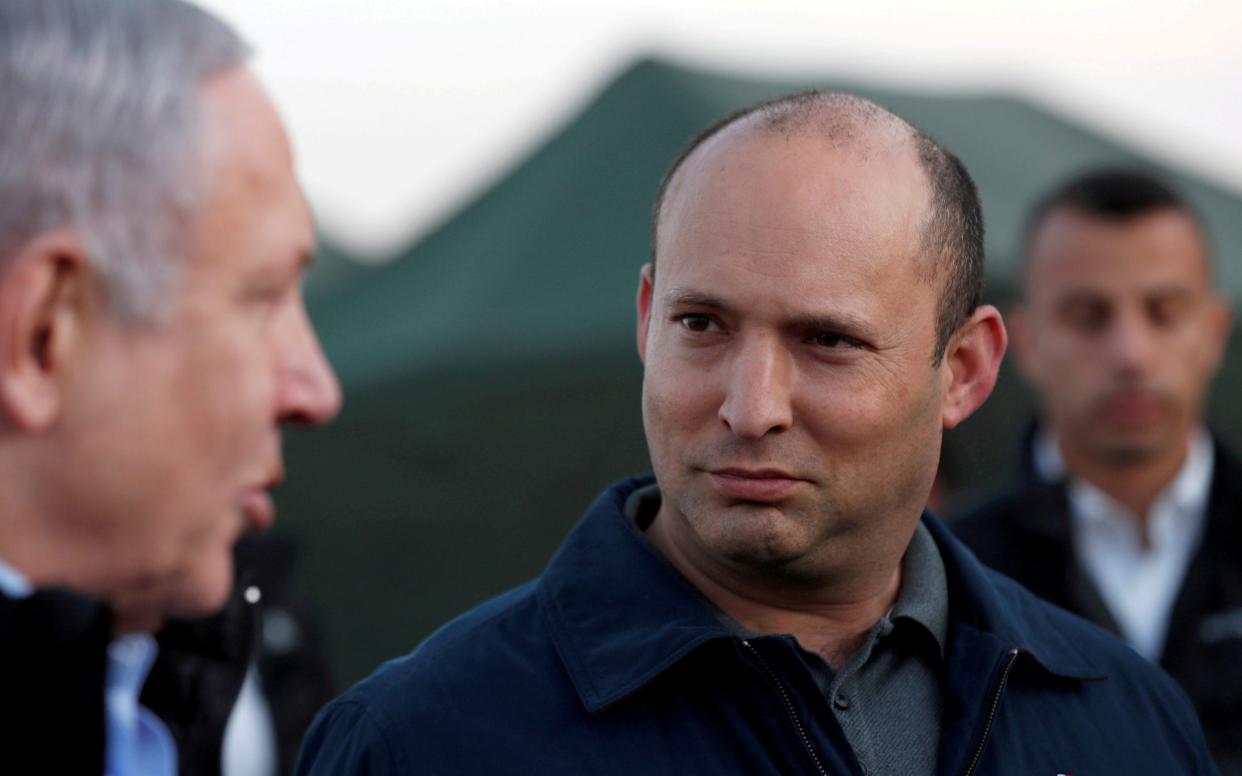Netanyahu on cusp of being replaced by far-Right leader Naftali Bennett

- Oops!Something went wrong.Please try again later.
- Oops!Something went wrong.Please try again later.
- Oops!Something went wrong.Please try again later.
Benjamin Netanyahu's rivals were on the brink of removing him from power on Sunday after Naftali Bennett, a right-wing firebrand, threw his support behind a coalition government with centrist leader Yair Lapid.
In a major step towards unseating Israel's longest serving prime minister, Mr Bennett said his Yamina party would back a "unity" coalition that would draw support from across the Israeli political spectrum.
"It's either a fifth election, or a unity government," Mr Bennett said in a televised speech.
He vowed to end the "madness" of Israel's worst political crisis in its history, which has seen four inconclusive election results since 2019.
According to Israeli media reports, Mr Bennett is finalising a power-sharing deal where he will serve as prime minister for two years before handing the reins to Mr Lapid.
In response, Mr Netanyahu on Sunday evening furiously accused Mr Bennett of trying to prop up a "left wing government" and claimed he was committing the "fraud of the century."
He also warned that a Bennett-Lapid coalition would "weaken" the state of Israel.
Palestinian leaders reacted by warning that an "extreme right" Bennett government would be "no different" from one led by Mr Netanyahu.

A self-made millionaire and former special forces commando, Mr Bennett has spent much of his political career trying to step out of Mr Netanyahu's shadow.
The 49-year-old is an outspoken supporter of expanding Israel's settlements in the West Bank and has claimed to be "more right-wing" than his former mentor.
He previously served under Mr Netanyahu as defence minister and minister for diaspora affairs, while in 2013 he controverisally compared the Israeli-Palestinian conflict to enduring "shrapnel in the rear end".
“The only thing consistent about Bennett is the hoodwinking of his constituents and the rest of right-wing voters, and throwing the ‘principles’ he talked about into the trash, all to be prime minister at any price,” Mr Netanyahu's Likud party said in a statement on Sunday.
The embattled prime minister had sought to scupper the emerging coalition by offering a power-sharing agreement to Mr Bennett and the right-wing New Hope leader Gideon Saar.
However, Mr Saar quickly rejected those overtures and has maintained his support for the anti-Netanyahu coalition.

Even if Mr Bennett's so-called "change" coalition ousts Mr Netanyahu, the alliance has little in common beyond its determination to end the prime minister's dynasty.
It would also require external support from Arab members of Israel's parliament, who vehemently oppose Mr Bennett's wider political agenda, such as annexing swathes of the West Bank, which is claimed by the Palestinians as their own land.
Due to the fragility of the alliance, it would likely avoid controversial policies such as settlement expansion and instead focus on reviving Israel's economy in the wake of the coronavirus pandemic.
Since April 2019, the Jewish state has held four inconclusive elections and is set to call a fifth later this year if coalition talks between Mr Lapid and Mr Bennett fall at the last hurdle.
At a meeting with Yamina members of parliament on Sunday, Mr Bennett reportedly said he was "marching towards a government of change." He has also insisted, in response to criticism for courting Arab and left-wing parties, that it is the only way to avoid fifth elections.
Mr Lapid, the head of the centrist Yesh Atid party, currently holds the mandate to form a new government but must finalise his power sharing agreement with Mr Bennett before the deadline on Wednesday.

If the coalition is sworn in, Mr Bennett, a modern Orthodox Jew who often appears in public wearing a kippah, would become Israel's first devoutly religious prime minister.
The power sharing deal, an alliance of centrists, left-wingers and Arab parties, would also reportedly include the Blue and White faction led by Benny Gantz, along with the hard-Right party Yisrael Beiteinu.
Mr Bennett and Mr Lapid had already been close to securing an agreement earlier this month, but the talks were suspended following the outbreak of the conflict in Gaza.
Mr Lapid suggested at the time that Mr Netanyahu had engineered the conflict in the hopes that it would help him cling to power.
"If we had a government, security considerations would not be mixed with political considerations," Mr Lapid claimed in a post on Facebook. "No one would ask themselves why the fire always breaks out just when it's most convenient for the prime minister."

